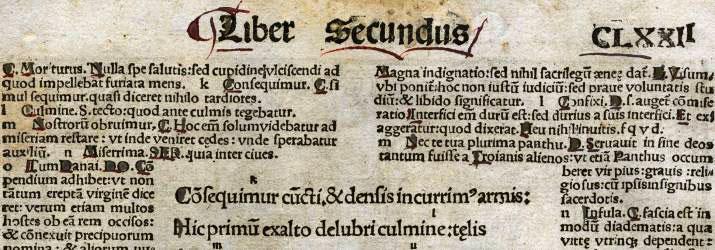
Why Study Latin?

Because Romance, the Renaissance and Rome Still Resonate Today
By studying Latin, you'll gain the basic toolkit for studying antiquity, the Middle Ages, the Renaissance, and Romance languages and literatures.
- You'll learn where your attitudes toward romantic love come from (Catullus and Ovid) and who wrote the first versions of all your favorite popular songs (Horace).
- You'll be relieved to know that Latin doesn't have arbitrary pronunciation. No silent letters or special characters!
- You'll study the foundations of your own society. You'll understand some of the reasons why people in the Western world think the way they do.
- You'll become a more skillful writer of English with a richer vocabulary and better understanding of sentence structure. You'll know what people mean when they tell you to avoid the passive voice and not to split infinitives.
Spartacus. Gladiator. Rome: Total War. Rome. Why?
- You'll learn why the Founding Fathers were obsessed with ancient Rome, why Washington, D.C., is full of Roman monuments, and why Rome continues to appear in today's movies, TV shows, comic books, and video games.
- You'll understand the names of plants, medical conditions, and lunar craters, and be able to name new ones after yourself.
- You'll know how and why Europeans talked about law, medicine, science, philosophy, religion, linguistics, art history, musicology, theology, and virtually any other subject in the Western world before about 1800.
- You'll impress law schools, medical schools, nursing schools, and maybe your friends and relatives, too. You can explain terms like "latissimus dorsi" and "erector spinae" to your buddies in the gym.
- You'll be in classes full of smart, hardworking people who want to be there.
Courses to Take
- LAT 1110 - Beginning Latin I
- LAT 1120 - Beginning Latin II
- LAT 2110 - Intermediate Latin I
- LAT 2120 - Intermediate Latin II
- LAT 2900 - Special Topics in Latin
- LAT 3110 - Latin Prose and Poetry I
- LAT 3120 - Latin Prose and Poetry II
- LAT 4110 - Advanced Latin Literature I
- LAT 4120 - Advanced Latin Literature II
- LAT 4900 - Special Topics in Latin Literature
- LAT 4930 - Independent Study in Latin